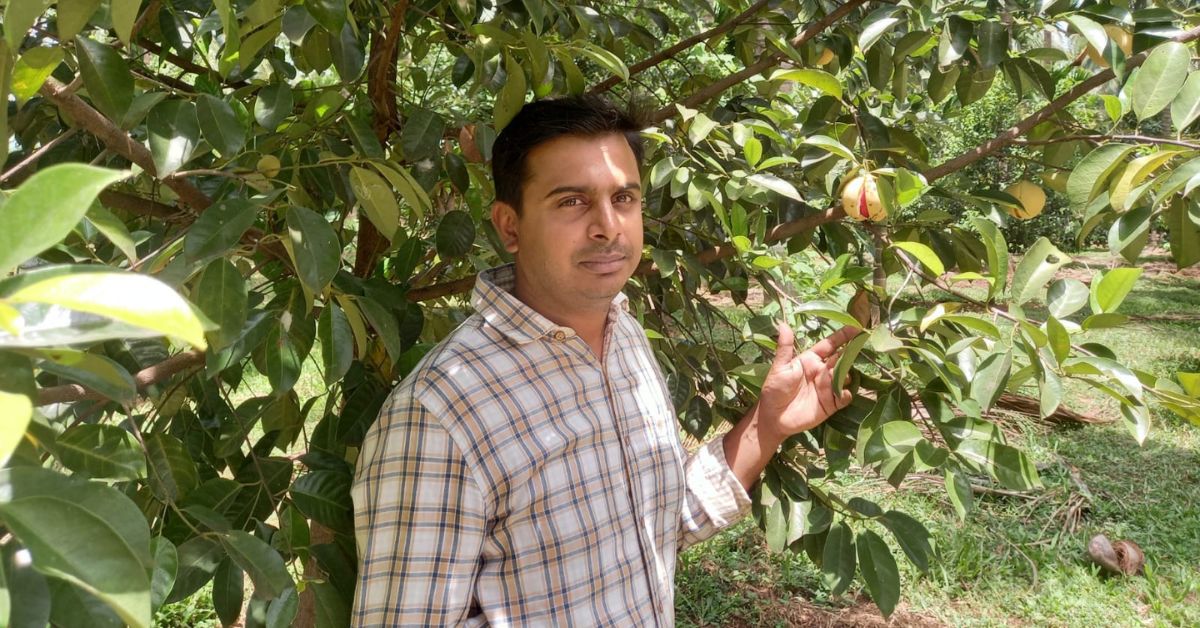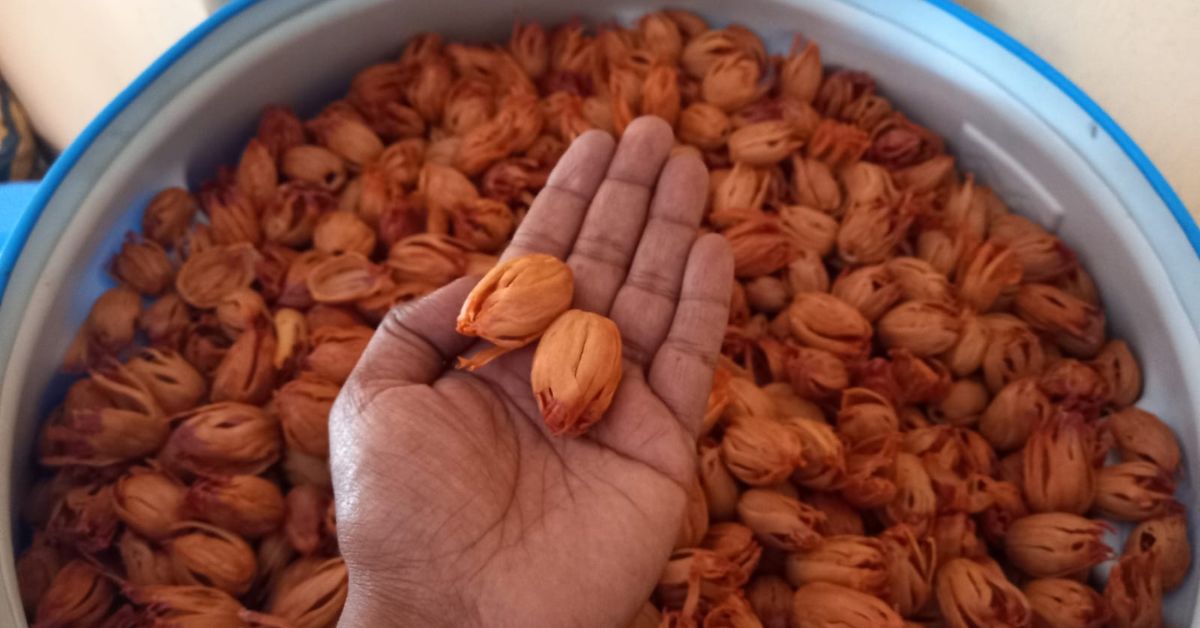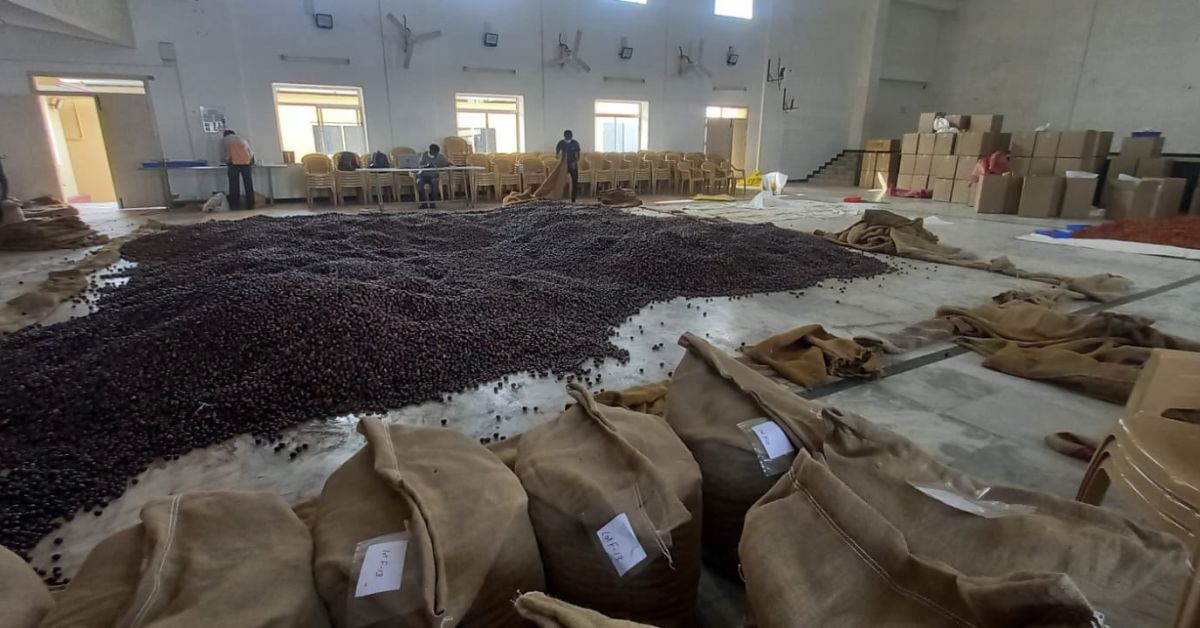Nestled in the ambit of the Western Ghats, 120 farmers in Pollachi village of Tamil Nadu regularly collect their nutmeg produce at the village centre. After segregating and sorting, their produce is sold to the end consumer without involving middlemen.
Vishwanath, who grows nutmeg on 11 acres of land, says, “Middlemen used to come to our house and take the produce from us. There was little scope of negotiation as they would quote the price as per their choice. We didn’t know the actual price at which our produce was being sold to the end user.”
To get out of the highly unorganised sector, the Pollachi village farmers undertook an innovative and transformative initiative to maximise the profits from their nutmeg yield by ditching the middlemen.
As many as 120 farmers, including Vishwanath, came together to form a Farmer Producer Company (FPC) to collectively sell their produce to end consumers.
This strategic shift enabled the farmers to personally export nutmeg produce to international markets such as Australia, Canada, and France, marking a significant milestone in their agricultural journey.
“This was the first time our produce was exported. It is just a new beginning for us,” smiles the 48-year-old farmer.
Annually, the farmers are able to generate a business of Rs 3 crore. With collective efforts, they have been able to boost their income. “Earlier, we would get only Rs 300 per kg for our produce. Because of lack of knowledge, we weren’t aware of how to negotiate a better deal. Now, we are able to sell our produce at Rs 470 per kg,” adds Vishwanath, who earned profits of Rs 50,000 by selling 550 kg of nutmeg last year.

This could have been possible due to the efforts of visionary farmer K Ranjit Kumar, who went on to form the FPC with a focus on nutmeg cultivation and trade, aiming to empower small to medium-sized farmers and revolutionise the traditional farming practices prevalent in the region.
A necessary coalition
After pursuing higher education in nanotechnology from Cambridge University, Ranjit worked in Bengaluru for two years. He returned to his village in 2017 after his father fell ill. “My father had chronic renal disease and his condition was slowly deteriorating. I decided to go back home and look after my parents,” he adds.
Upon returning home, he had to look after the 60-acre farmland of his family. That’s when Ranjit decided to venture into nutmeg cultivation. “Compared to other traditional crops like coconut, I decided to grow nutmeg as it is known for its dual yield of nutmeg and mace. It is a prized commodity for farmers in the region,” he shares.
Soon, Ranjit understood that the existing supply chain involved multiple intermediaries including aggregators, wholesalers, local liaison, and middlemen. At each level, they were generating considerable profits, more than the growers.

“I was growing nutmeg on 10 acres of land. For traders, I was a very small farmer. They would come to my place and start ranting about quality without any convincing remarks,” he says.
“Once, I got irritated and asked the middlemen to give me an explanation on the best quality of nutmeg. We got into a heated argument and he ran away from my house. I came to know that other farmers were at the mercy of traders. While we do all the labour work from harvesting to drying the produce on rainy days, they keep exploiting us. The secret to our success lay in cutting all these intermediaries,” he says.
This incident was a turning point for Ranjit. Recognising the inefficiencies and exploitative nature of this setup, he and the farmers decided to take matters into their own hands.
Breaking free from traditional constraints
Ranjit started reaching out to likeminded farmers to streamline the supply chain process and establish direct contact with exporters. They gradually formed an FPC to bypass the middlemen.
He organised a series of training programmes and field visits to institutions such as the ICAR (Indian Council of Agricultural Research) – Indian Institute of Spices Research (IISR) to understand scientific cultivation methods, quality standards, suitable varieties, soil testing, and post-harvest practices.
The FPC implemented practices such as aggregating produce at a common location for quality assessment, segregating first-grade material for direct export, and selling second-grade material to local traders for oil extraction.
This targeted approach not only ensured better returns for the farmers but also highlighted the importance of maintaining high standards in agricultural produce.

Moreover, Ranjit says, the FPC introduced financial transparency by establishing a dedicated bank account for all transactions in order to enhance accountability and trust among the members.
Beyond the economic advancements, the FPC also aims to explore alternative uses of nutmeg byproducts, such as utilising the fruit to produce value added products like jam, jellies, and pickles. “This diversification strategy not only enhances the product portfolio but also opens up new avenues for market expansion and revenue generation,” says Ranjit.
Through collaborative efforts and innovative strategies, Ranjit has not only empowered the farmers but inspired them to break free from traditional constraints and pave the way for sustainable growth in the nutmeg industry.
“Here, I have to play multiple roles from being the watchman, clerk, auditor to manager of the company. But at the end, I derive contentment in the fact that I was able to end the plight of 120 farmers in my village. These small farmers who lacked traceability and did not know where their produce was being sold are now exporting their crop to far off places in Australia and Canada,” he says.
Edited by Padmashree Pande. All photos: Ranjit Kumar.
No comments:
Post a Comment